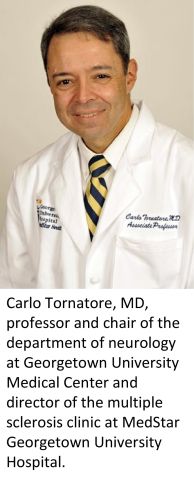Georgetown Neurologist Launches New “Medical Home” Study for MS Care

Posted in GUMC Stories
April 21, 2017 - A Georgetown physician-researcher has launched a first-of-its-kind study to test a medical care model that could change the way people with multiple sclerosis (MS) are treated.
The model being studied is called a “medical home.” It’s not a place where people live but a clinic that addresses all of a patient’s medical needs under one roof.
Medical homes have become more common in the primary care setting, but the concept is new for managing disorders that require highly specialized care such as MS.
“This is a novel and forward-thinking approach to the continuous care of patients with MS, a group of patients with significant physical and cognitive disabilities that have a profound impact on their quality of life,” says Carlo Tornatore, MD, professor and chair of the department of neurology at Georgetown University Medical Center and executive director of the multiple sclerosis clinic at MedStar Georgetown University Hospital.
Transformative Care
Tornatore and his colleagues will invite up to 500 of their current patients to participate in the clinical study.
Patients with MS typically work with a wide range of specialists to address their health needs. However, those specialists don’t always operate as a team. This study will assess whether a medical home approach produces better outcomes than the standard medical practice for those patients.
Additionally, the medical home model would reward physicians for prevention and comprehensive care over what he describes as the current “wasteful” standard “fee-for-service” compensation.
“We want to transform the way we take care of patients,” Tornatore says. “We all know that total care is the way that physicians should practice and we believe our study will prove it works in managing MS by improving patient outcomes at less cost for the patient.”
Patient Centered Care
The neurologists in Tornatore’s MS clinic will work hand-in-hand with primary care physicians and the patients participating in the medical home study. In addition to the symptoms of MS, the team will address all the medical issues affecting their patients.
“We know, for example, that some of the drugs we use can impact hypertension or can increase risk of infection,” he says. “As a team, we can make a comprehensive plan to tailor the treatment, given the patient’s comorbidities,”
Patients and physicians will keep in touch through a secure web portal while regular phone calls, emails, questionnaires and clinic visits will provide a comprehensive, ongoing physical and mental view of each patient’s health.
Additionally, patients will be able to log their medication use daily, along with changing health issues — all of which can be shared in real time with their physician.
In short, the health care team at the MS home will know everything they need to understand about a patient’s health in order to effectively treat all ongoing issues and prevent others, says Tornatore.
A Model for Other Disorders
The medical home study (called MS-ADVANCE) is being supported by a sponsored research agreement from Biogen, a biotechnology company that specializes in neurological and neurodegenerative diseases.
Tornatore believes many of the 3000 patients he sees — the MS clinic is one of the largest in the country — will be happy to participate in the study. If successful, Tornatore says, the medical home model of MS care can be adapted for many brain and nerve disorders.
“We anticipate that by changing how we care for MS patients, we will see much improved outcomes, both patient-centered outcomes as well as traditional outcome measures — hospital admissions, emergency room visits, cost of care and so on.”
Renee Twombly
GUMC Communications
